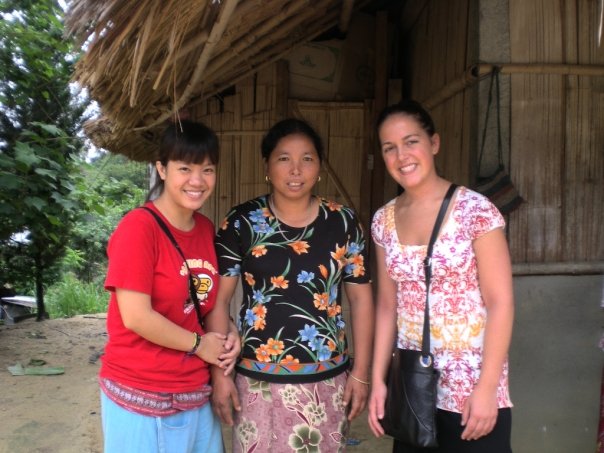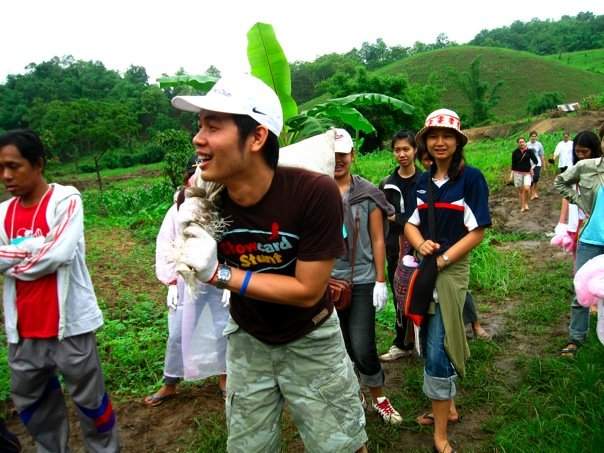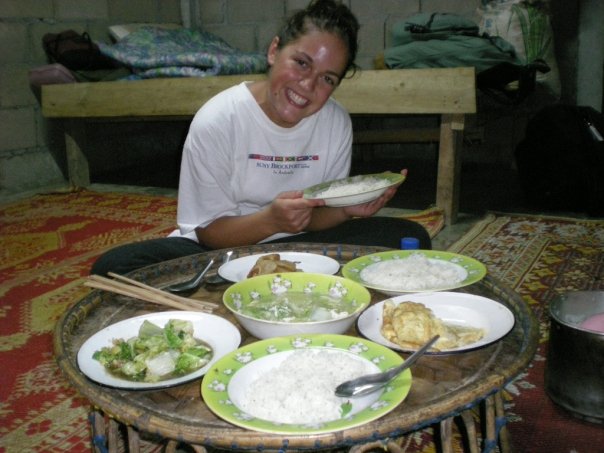6:00 AM. I can hear my homestay mom stirring about in the kitchen. She’s probably been awake for at least an hour. Forcing myself off the wooden bench that acts as my bed, I rummage through my backpack and pull out a towel. Nothing like a nice, cold bucket shower to wake you up in the morning.
This experience in Chiang Rai is my first time traveling alone, as well as truly visiting a place at ground level. While I’ve enjoyed my fair share of all-inclusive resorts, Caribbean cruises, and amusement park-inspired road trips, I have never partaken in the culturally-immersive travel that I am now.
Before coming to Thailand, I never thought I could live without the comforts of home. In New York, I enjoyed hot showers, driving a car, blow drying my hair, and going to the toilet without being ambushed by spiders and toads. However, seeing how simply the people of rural Thailand lived and how happy they were pushed me to begin thinking about what was really important in life. And now, I was going to get to experience life from a local point of view by living with a family in the Akha Village.
While I have come to Thailand to teach English, the Akha people are without clean water. Volunteers are needed as soon as possible to help work on a dam project. This is where I come in.
Becoming family

Although I have never lived in a bamboo hut, I instantly feel at home. My “mother” constantly makes sure I am well fed, cooking extra rice, meat, and vegetables and stuffing me with fresh, local fruits. She notices I favor lychees, so she keeps a bowl out for me. It’s amazing how generous she is, despite having very little.
Her excitement is contagious, and it’s impossible not to play along with her eager encouragement. She’s trying to make me feel like part of the group, and she’s doing a good job.
The community itself is also very welcoming. At night we all meet in the community center, a modest, unfurnished cement building where the villagers put on cultural performances and enjoy songs, dancing, and games. During one particularly silly song where the locals are chanting and swinging each other around, I inch my way into a corner, wanting to watch but feeling too self conscious to join in. Suddenly, I am pulled up from the floor as one of the villagers yanks me into the circle, giggling. Although she doesn’t speak English, she acts out the movements dramatically. Her excitement is contagious, and it’s impossible not to play along with her eager encouragement. She’s trying to make me feel like part of the group, and she’s doing a good job.
[social]
Teaching at the local school is also a comforting experience, from my “mom” packing me a daily rice and vegetable lunch wrapped in banana leaves to the children constantly hugging me and sitting on my lap. The final day of teaching before the dam project I am a ball of mixed emotions, happy to have gotten to know the children, but sad to leave them. There is also excitement at the thought of helping the Akha villagers gain access to clean water, but nervousness about the labor aspect of the project. I remind myself of the importance of keeping a positive outlook.
Fill out a traveler profile and find other like-minded travelers like you!
The day of the dam

“Jessie, wake up. It’s 5 in the morning,” Pam, another volunteer, whispers, poking me in the side. “We need to get up if we’re going to be on time.”
I moan, rolling away from her. Voices and foot steps can be heard around the house and outside. It’s the break of dawn, and the village is alive and ready to take on the project. I’m having trouble even opening my eyes.
Our mother brings us an omelet from last night and packs us a lunch of rice and meat wrapped in banana leaves. She hands me a poncho because it is supposed to rain and gives me a proud hug like any good mom would.
The hike to the dam is arduous. The villagers lead the way through narrow forest paths caked with thick mud. My flip flops get stuck multiple times and I even fall on my butt. After walking for about a mile we come to the top of a steep hill.
“We have to go down this?” I ask Pam in disbelief.
She doesn’t need to answer, as I see the volunteers disappear one-by-one, as if being swallowed whole by the valley below. As I’ve already demonstrated my clumsiness, I remove my flip flops and decide to use a different method to make it down. Sitting on the dewy grass, I inch my way down on my backside. It may not be the cleanest method, but at least my ankles will remain unbroken.
We walk for about another mile until we come to the bottom of a mountain. I notice some older male villagers near a pickup truck. As I get closer, one of the men turns to me, holding out two heavy sacks.
My eyes go wide. “You want me to carry these?”
At 5’2″ and 115 pounds, I do not see how this is possible. It is during this moment of doubt that I notice a small Thai boy, probably seven or eight, sprinting past me clutching two sacks.
Okay, so it is possible.
Saying a short prayer, I reach out to grab the sacks.
“Ah!” I yelp, crumbling to the ground under the mass. Apparently, the sacks are filled with rocks and sand.
Blushing, I hand the man back one of the sacks. Let’s see if I can carry a single bag first.
Following the rest of the volunteers, we begin the trek into the mountain. The path is so narrow and full of bush that I can barely see ahead of me, and the uphill climb is incredibly steep. Suddenly, the trail becomes a precipitous ledge where one can literally break their neck if they fall.
“Where is the dam?” I ask the villagers numerous times. I know I sound like a child on their first road trip, but I don’t care. I can’t do this much longer.
After what feels like five hours, I finally make it to the site of the project. The older men are taking the sacks as well as collecting big boulders and doing the construction part of the dam. I walk in their direction to help, but am shuffled back toward where I came from.
“We need to go get more sacks,” Pam explains.
I sigh, tears welling in my eyes. “I can’t do this.”
“But, we came here to help these people. This is what they really need. After the dam is built they will have clean drinking water.”
That’s when it hits me. Looking around, I suddenly realize I am the only one complaining. All the volunteers, and especially the villagers, seem content, happy even, to build this dam. For them, this is literally going to save their lives. How could I forget not everyone can simply turn on their tap and have clean water magically appear in a glass? It was time to stop complaining and start working to complete this life saving project.
I jog back to the truck, eagerness propelling me forward. The Thai man handing out the sacks seems to remember me as he pushes a single bag in my direction.
I shake my head. “I’ll take two.”
And I did take two, along with everybody else, working together until the entire project was complete. At the end of the day, the feeling of joy and hope was palpable. How could it have not been? This dam was going to save the villagers’ lives.
After the dam

The change in behavior I saw in myself that day wasn’t simply a momentary rush. I was never able to get it out of my head – the wide-eyed looks of elation, the way my house mother hugged me, the way my shy house sister seemed to instantly warm up to me. My efforts had helped one community, but how many more were out there that needed saving?
As you explore the world and have different experiences, your outlook on things change.
It quickly became ingrained in me that there was more to life and travel than weekend trips to Miami and jaunts to Vegas. As soon as I returned home, I not only signed up for some slots with Habitat for Humanity in New York, I also booked a plane ticket to Ghana, where I would live with a local woman in Achiase and work at a local orphanage.
If you had asked me before Thailand if I would ever travel to Africa, my reply would have entailed a safari or beach-focused itinerary; however, as you explore the world and have different experiences, your outlook on things change. Now, my focus was on working with communities in need. Of course, I still one day hope to take part in an African safari. I just think there is a lot of work to be done first.
To read more stories about how travel has impacted people’s lives, check out the following articles:
- From Corporate Tool to Nomadic Idealist
- Escape the Rat Race
- Travel in India: A Healing Journey
- Confessions of a Lifestyle Traveler
- Getting Your Boots Dirty: How Volunteering in Africa Changed Me
- Travel Made me Who I Am Today
- How a Dog Walk Changed My Life Forever
- Why You Should Forgo the American Dream and Let Travel Transform Your Life
- Getting Outside The Box: One Family’s Journey to Full Time Travel
